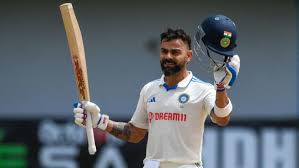Virat Kohli’s remarkable twin centuries at the Adelaide Oval in 2014 marked a defining moment for Indian cricket. His performance not only signaled the beginning of his Test captaincy but also set a fierce tone for future India-Australia encounters, showcasing the hunger and determination that would soon characterize his leadership.

An Emotional Series After a National Tragedy
The 2014-15 Border-Gavaskar Trophy was a memorable yet somber series, taking place shortly after the tragic passing of Australian cricketer Phillip Hughes. This sorrowful backdrop only intensified the competitive spirit between the two sides, and in Kohli, Australia found an opponent ready to challenge them fully. For the first time, Kohli was captaining India in a Test after MS Dhoni was sidelined with an injury, and this was a young Indian side eager to prove itself on foreign soil.
New Beginnings for India in Adelaide
The Indian squad had undergone a generational shift since their previous tour, bringing in fresh faces like Shikhar Dhawan, Murali Vijay, Cheteshwar Pujara, Kohli, Ajinkya Rahane, and Rohit Sharma. Kohli’s first match as captain, however, didn’t begin on a positive note. Australia, batting first, posted a massive 517, with David Warner, Michael Clarke, and Steve Smith all scoring centuries. India’s bowlers found it challenging to break through, setting the stage for a daunting chase.
Kohli’s First Century as Captain
When India began their response, they were steady at 111-2 when Kohli came to the crease. Displaying maturity and poise, Kohli led with a dominant knock of 115, hitting 12 boundaries and attacking Australia’s bowling with ease. Supported by solid contributions from Pujara, Rohit, and Rahane, India reached 444, although they were still trailing Australia’s imposing first-innings total.
A Fierce Chase in the Final Innings
Australia’s second innings, led by another Warner century, set India a challenging target of 364 in the fourth innings. Despite early setbacks, Kohli launched an extraordinary counterattack, taking on Australia’s bowlers with a brilliant display of intent and resilience. His partnership with Murali Vijay, worth 185 runs, brought India tantalizingly close, with the team needing only 120 runs and eight wickets remaining. But after Vijay was dismissed on 99, the Australian bowlers, particularly Nathan Lyon, seized their opportunity to break through India’s middle order. Kohli, despite his best efforts, eventually fell trying to accelerate, and India fell short by just 48 runs.
A Performance That Redefined Indian Cricket
Though India narrowly missed victory, Kohli’s twin centuries sent a powerful message: India was no longer content with just competing—they were in Australia to win. His performance in Adelaide laid the foundation for a new era in Indian cricket, characterized by an aggressive and fearless mindset. Kohli went on to score four centuries in that series, matching Steve Smith’s prolific form and cementing his place as one of the greats.
Later in the series, Kohli took over the Test captaincy permanently following Dhoni’s unexpected retirement. Under his leadership, India would go on to dominate at home and seek success overseas, with Kohli guiding the team to its first-ever series win in Australia in 2018.
Reflecting on that Adelaide Test years later, Kohli shared on social media, “Although we didn’t cross the line, being so close taught us that anything is possible if we set our minds to it. This match will always be a significant milestone in our journey as a Test team.”
Kohli Returns to Australia with an Eye on History
Now, nearly a decade after his debut as Test captain, Kohli returns to Australia, leading a team that has not only won a series there but aims to continue its dominance. His twin tons in Adelaide remain a pivotal moment in Indian cricket, symbolizing the grit and ambition that define Kohli’s captaincy and India’s modern Test team.


